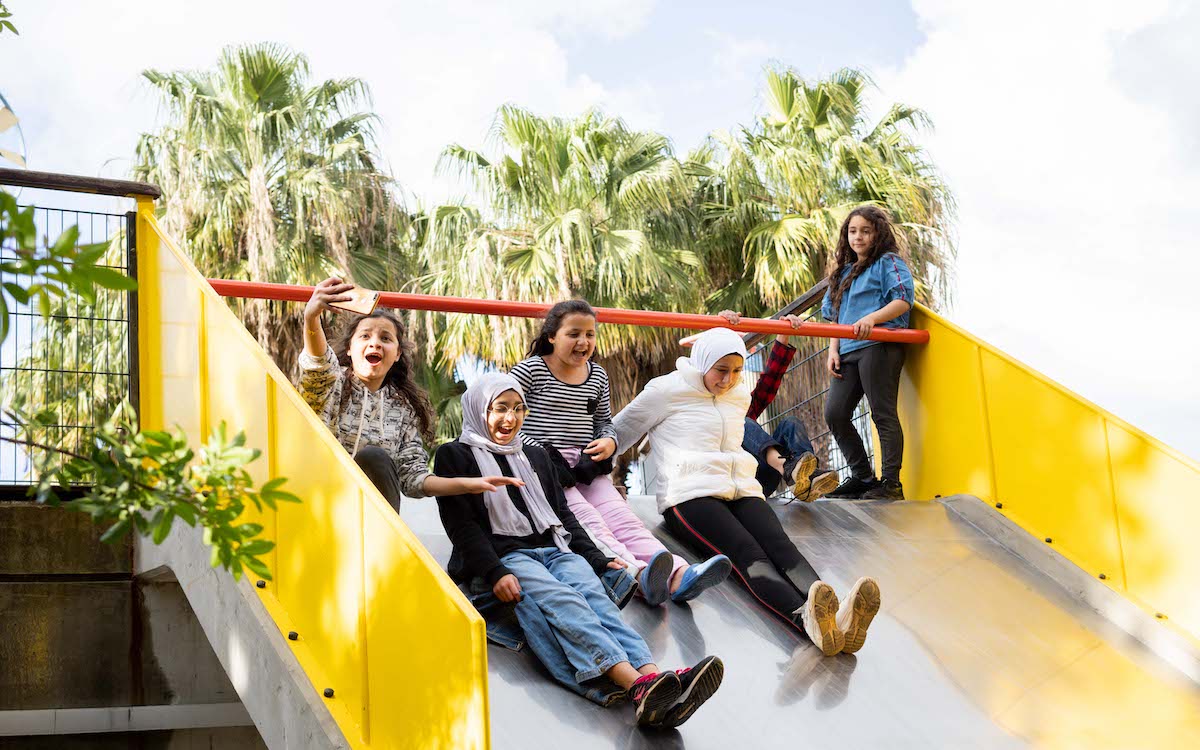
As Lebanon continues to suffer under an omnipresent economic crisis, freely accessible public spaces are more important than ever before, providing a much-needed place for relaxation, learning, and play.
While it is common to see young men using sports fields and football courts, Lebanon is severely lacking in options for young women, especially teenage girls. At the same time, because these spaces are usually dominated by males, many young girls feel uncomfortable or unsafe, causing them to stay home.
“We saw that there is [a need] to engage directly with teenage or adolescent girls,” Joana Dabaj, Co-founder and Director of Programmes at CatalyticAction told NOW. “The way they experience the city is changing [as they are becoming] an adult, and the way they use the space is very different from any other age group.”
CatalyticAction is a charity that specializes in using design and architecture to empower vulnerable communities, with a particular focus on children and youth. By using a participatory approach that engages with local youngsters, they can better address the specific needs of their beneficiaries.
The initiative’s pilot project will be built in Beirut’s Karantina neighborhood, which has a long history of hosting displaced communities, including Palestinians, Syrian refugees, and other migrants, as well as impoverished Lebanese. In 2020, the area was severely damaged by the Beirut Port explosion, exacerbating pre-existing struggles and increasing tensions between different groups.
“Public spaces play a very important role, especially in the current economic crisis affecting everyone,” said Samar, a 43-year-old mother living in Karantina. “They are our breather space, [but] “I fear for my daughters in public spaces from being bullied and harassed.”
“My family doesn’t let me get out of the house, because I am a girl, not a boy,” echoed Yara, 14.
Despite being considered one of the most liberal countries in the Arab world, many young women in Lebanon report being subjected to verbal and physical sexual harassment by men. Because of this, personal safety is chief among their concerns, with many choosing to remain at home, causing them to miss out on vital social, cognitive, emotional and physical skills that young people typically develop through interacting with others in a public setting.
This exclusion also perpetuates the perception that women are ‘weak’ and ‘vulnerable’, contributing to negative stereotypes and a patriarchal culture that leads to further harassment and violence against women.
“When I was growing up, as soon as I became a teenager, I felt that my use of public spaces was shrinking, while that of my brothers and my cousins – who were men – was increasing,” said Dabaj. “I had more limitations on my appearance and going out. We used to play football near my house but, when I reached that age, suddenly I couldn’t anymore. This is a common experience for young girls.”
Catalytic Action has worked hard to develop strong relationships with the residents of Karantina, using participatory projects implemented within the neighborhood itself. This has enabled the charity to work closely with adolescent girls, tackle sensitive but essential topics like privacy, inclusivity, and safety.
By doing this, they hope to strengthen the role of young women in Lebanese society and challenge the entrenched, sexist preconceptions that limit their movements and opportunities.
“We will work with a group of adolescent girls from the neighborhood that represent different backgrounds and communities,” explained Dabaj “[We want them] to express themselves in a safe environment, while also talking with their peers about the issues. We use a lot of storytelling, drawing and lots of art mediums because we found they’re fun and nice ways for them to express themselves, especially when the topics are very sensitive. Our role, as architects, is simply to guide this process and empower them.”
“We’re not claiming that we’re solving these gender inequalities,” she continued, “but we want to start from understanding the experiences [of young girls], and how their experiences in the city can allow us to learn together how their environment plays an important role [in beginning to] address this issue. If we try to provide solutions for what makes them feel unsafe, I think this is a good start.”
If the pilot scheme in Karantina is successful, Catalytic Action hopes to extend their project to other parts of Beirut.
Robert McKelvey is a multimedia journalist with @NOW_leb. He tweets @RCMcKelvey.







